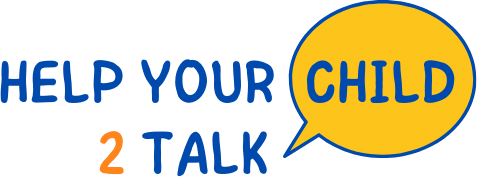Parents whose children have speech, language, and communication delays or disorders often find themselves caught between wanting to protect their child’s privacy and needing to inform others about their child’s unique needs. In this article, we will offer guidance related to an important question you may have, “What should I tell people about my child’s speech and language difficulties?”
Understanding Speech, Language, and Communication Delays/Disorders
Before addressing others, it’s crucial to understand the difference between speech, language, and communication delays/disorders:
- Speech Delay/Disorder: Refers to difficulties with the production of speech sounds to produce words.
- Language Delay/Disorder: Pertains to difficulties understanding language and/or using language to express thoughts, feelings, and ideas.
- Communication Delay/Disorder: Covers challenges with exchanging ideas and information using language.

Talking to Family and Friends About Your Child
- Be Open and Honest: If you feel comfortable, be open about your child’s challenges. It can lead to more understanding and support from your loved ones.
- Example: “Jamie has a speech delay, which means he sometimes struggles with pronouncing words correctly.”
- Educate and Inform: Arm yourself with information about your child’s delay or disorder. This way, you can provide accurate information and dispel any misconceptions.
- Example: “Sarah’s language disorder means she processes and uses language differently than others.”
- Set Boundaries: If certain topics or discussions make you uncomfortable, don’t hesitate to set boundaries.
- Example: “We’re working with a specialist for Emma’s communication challenges. We appreciate any support but would prefer not to receive unsolicited advice.”
Addressing Your Child’s Peers
- Simplify the Explanation: Use age-appropriate language to help peers understand without confusing them.
- Example: “Sometimes, Noah needs a little more time to say what he wants. Just like some of us need more time to tie our shoes.”
- Promote Inclusivity: Encourage playdates and activities. This fosters understanding and reduces any potential stigma.
- Example: “Lucy communicates differently, but she loves to play just like you. Let’s find a game you both enjoy.”
FAQs
- Will my child catch up with their peers?
- Every child is unique. Some children may catch up with their peers, while others might always have some challenges. Early intervention and speech-language therapy can be highly beneficial.
- How can I help my child at home?
- Engage in conversation, read together, and play interactive games. Consistency and patience are key.
- Is there a known cause for these delays/disorders?
- Causes can vary widely, including hearing loss, genetic factors, and/or environmental influences. Sometimes, there is no clear cause.
- How do I handle negative comments or reactions?
- Arm yourself with knowledge, be patient, and consider educating the person if you feel it’s appropriate.
Additional Resources
- The American Speech-Language-Hearing Association (ASHA)
- Description: Offers a vast range of resources about speech, language, and communication disorders with a section of resources just for parents.
- The Hanen Centre
- Description: Provides programs and resources for parents of children with language delays.
- Apraxia Kids
- Description: Dedicated to supporting children and families affected by childhood apraxia of speech.
- Understood
- Description: A platform offering support for families of children with learning and attention issues.
- Early Communication Development and Down syndrome, Boston Children’s Hospital
- Description: A comprehensive guide for parents of children with a diagnosis of Down syndrome.
- The Stuttering Foundation
- Description: Provides free resources, services, and support to those who stutter and their families.
- Cleft Lip & Palate Association (clapa.com)
- Description: Association with a wealth of resources dedicated to supporting children and families affected by cleft lip and/or cleft palate.
- What is Cerebral Palsy? | Cerebral Palsy Research Network (cprn.org)
- Description: Network offering comprehensive information and resources related to cerebral palsy.
- First Concern to Action | Autism Speaks
- Description: Comprehensive resource for parents, providers, and individuals that focuses on promoting understanding, support, and advocacy for autism.
Summary/Conclusion
Navigating conversations about your child’s speech, language, or communication delay/disorder requires a balance of openness, education, and sensitivity. Being equipped with accurate information, and approaching each situation with patience, ensures that your child receives the understanding and support they deserve. Remember, each child is unique, and their journey will be as well.




0 Comments